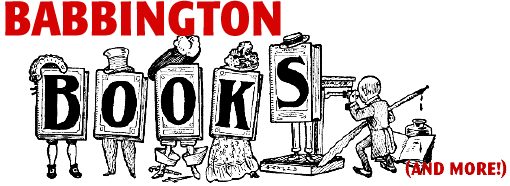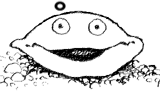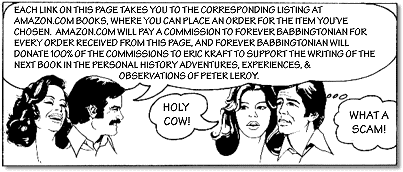


Spokesmollusk for Babbington
"Clam Capital of the World"

 |


Spokesmollusk for Babbington "Clam Capital of the World" |
| Every order helps support the writing of the Personal History, Adventures, Experiences & Observations of Peter Leroy by funneling funds to the author through the Forever Babbingtonian Foundation, a fictional outfit dedicated to funneling funds to the author. |

The Painter of Modern Life
|
Baudelaire on the Relative Value of the Natural and the
Artificial
“The Painter of Modern Life”
(translated by Jonathan Mayne) |

Leaving Small’s Hotel
|

Exemplary Stories
|
Miguel de Cervantes on the Power and Privilege of Beauty
“The Little Gipsy Girl” from Exemplary
Stories
|

At Home with the Glynns
|

The Artificial Kingdom
|
Celeste Olalquiaga on the Signature of Lost Time
Celeste Olalquiaga, The Artificial Kingdom: A Treasury
of the Kitsch Experience, with Remarkable Objects of Art and Nature, Extraordinary
Events, Eccentric Biography, and Original Theory, plus Many Wonderful Illustrations
Selected by the Author
|

What a Piece of Work I Am
|
|
[CLICK TO BUY] |
Georges Perec on the Craft of Making Visible the Invisible
Path of the Woodworm
Georges Perec
Life: A User’s Manual |

Where Do You Stop?
|

Jean Cocteau The Difficutly of Being
|
Jean Cocteau on the Pleasures Derived from Listening
to the Author Read His Own Work
Jean Cocteau, “On Measurement and Marcel Proust,” in The
Difficulty of Being
(translated by Elizabeth Sprigge) |

Reservations Recommended
|

Present Past
|
Eugene Ionesco on the Child’s Awareness of Time
Eugene Ionesco, Fragments of a Journal
[OUT OF PRINT; CLICK TO BUY USED] |

Herb ’n’ Lorna
|

The Life and Opinions
|
Laurence Sterne on the Art of the Preface
Laurence Sterne, Tristram Shandy
Book V, Chapter XXXI |
Little Follies
|

QED
|
Richard Feynman on the Value of a Firm Belief in Common
Sense
Richard Feynman, QED: The Strange Theory of Light and
Matter
|

Leaving Small’s Hotel
|

Slowness
|
Milan Kundera on Why Peter Leroy Is Taking So Long to
Write His Memoirs
Milan Kundera, Slowness
|

At Home with the Glynns
|

The Principle of Hope
|
Ernst Bloch on a Calculated or Created Kind of Hope
Ernst Bloch
The Principle of Hope, Volume 1 |

What a Piece of Work I Am
|
YOU WILL FIND MORE BOOKS
OF PARTICULAR INTEREST TO A READER OF
THE PERSONAL HISTORY, ADVENTURES,
EXPERIENCES & OBSERVATIONS OF PETER LEROY
HERE
NOTE: The links to sites
and images were accurate and active when I inserted them, but things change,
and I have no control over that.
—Mark Dorset, Webmaster,
Stock Boy

 |
In Association with Amazon.com Books
Amazon.com is pleased to have Forever Babbingtonian in the family
of Amazon.com associates. We've agreed to ship books and provide customer
service for orders we receive through special links on
Forever Babbingtonian.
Sincerely, Jeff Bezos
P. S. We guarantee you the same high level of customer service you would receive at Amazon.com. If you have a question about an order you've placed, please don't hesitate to contact us. |
COMPONENTS OF THE WORK REVIEWS OF THE ENTIRE WORK AUTHOR’S STATEMENT LITTLE
FOLLIES
|